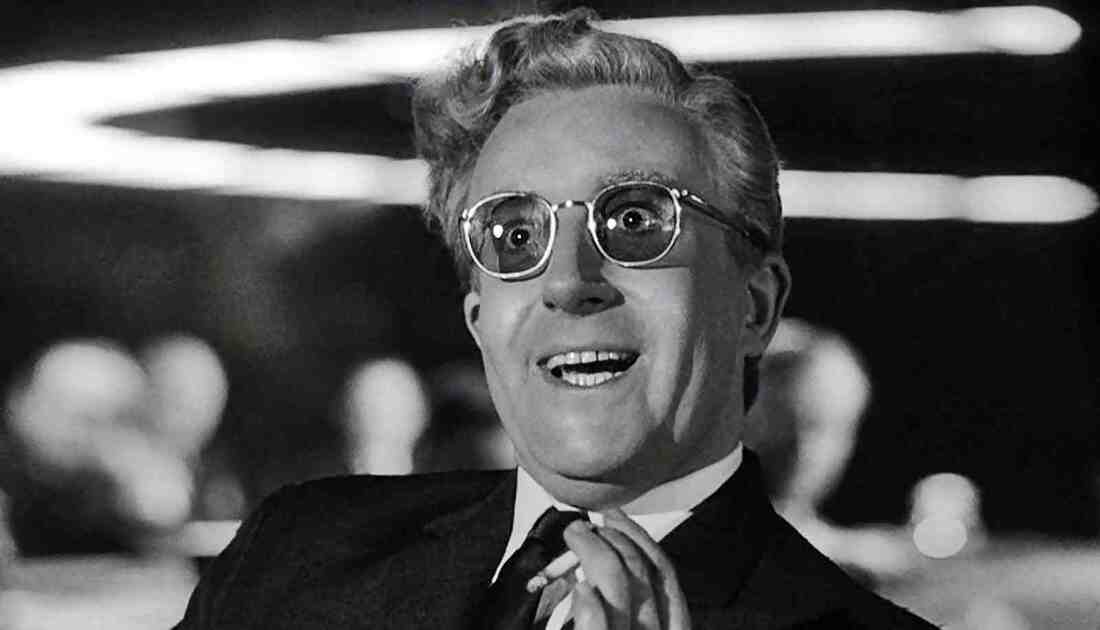Evan D.Of all film genres, it seems to me that comedy has the worst reputation when talking about classic movies. It makes sense, humor is far from static. What we find funny now may have been appalling to our grandparents (who among us hasn’t had an awkward experience watching a movie with older family member.) Conversely older comedies can feel inaccessible at best and outright racist, sexist or homophobic at worst. Crowd pleasers of old can feel entirely inaccessible now and often lead to the negative image of classic film, so for this week’s throwback lets talk about a nearly 60 year old comedy that still holds up: Dr. Strangelove. Officially the title of Stanley Kubrick’s (2001: A Space Odyssey, The Shining) Cold War comedy is Dr. Strangelove, or: How I Learned to Stop Worrying and Love the Bomb, just to give a sense of the off-kilter brand of humor it entails. Famous for his genre spanning work, Kubrick’s foray into comedy is as meticulously crafted as any of his other productions. An ensemble film, Dr. Strangelove follows all the various decision makers after an order comes down to launch a nuclear strike on the Soviet Union. Power mad, and aptly named, General Jack Ripper (Sterling Hayden) sets in motion the nuclear strike, giving President Muffley (Peter Sellers) and his team of generals just two hours to avoid all out nuclear war. Advising the president is trusted General Turgidson (an uproariously funny George C. Scott) and defected Nazi scientist Dr. Strangelove (also Peter Sellers.) Over the course of their time in the war room, this bunch skewer the beaurocratic and self serving nature of government. Even on the brink of calamity these civil servants can’t come together to avert it. For the most part, the humor of Dr. Strangelove holds up shockingly well. Perhaps because it’s grounded in ridiculous people operating within ridiculous systems rather than chasing jokes about a fleeting moment in time. Scott’s Turgidson is a tour de force of incompetence masked in military bravado. Sellers’ Muffley, by far the best of the three characters he plays, can’t resist making pleasantries in moments of urgency. It’s tough to beat a film with such dynamic performances. Kubrick’s auteurist touch is present across the film as well. A brilliant running gag has billboards or posters backgrounding moments of violence with the simple phrase “peace is our profession.” A small detail, but one that laces even straightforward moments with biting satire. Dr. Strangelove is a denser comedic achievement than most modern efforts. When laser focused in the war room, the film is hysterical. Unfortunately the ensemble nature of Dr. Strangelove leaves things a bit uneven. One particular plot featuring the soldiers actually tasked with executing the bombing mission feels like nothing more than exposition for the much stronger other segments until the film’s final moments. A small gripe, but an important one as it can take a viewer out trance induced by the more interesting plots. More than anything, Dr. Strangelove is proof that comedy doesn’t have to be reactionary. When done right humor can transcend generations. Kubrick continued directing all the way through 1999, so if you are already a fan of his work, Dr. Strangelove will be right up your alley. If you’re new to Kubrick’s films, this is a very accessible place to start. Dr. Strangelove is available to rent on most platforms Throwback Thursday is a weekly column offering a chance to explore some of the most notable films of bygone eras. There are no rules other than a release date before 1990. If you agree or disagree with this week’s review leave a comment below. If you have any requests for future editions send them to [email protected]!
Comments
|
Categories
All
Archives
April 2024
|
